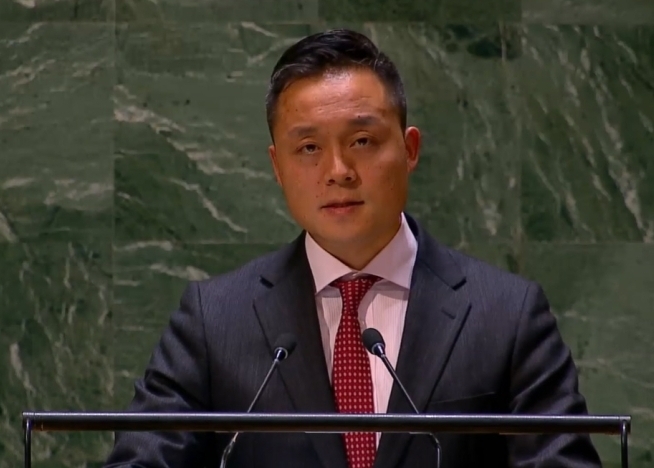第78回国連総会本会議「海洋及び海洋法」(議題75)における長野参事官ステートメント
令和5年12月5日

Mr. President,
At the outset, I would like to take this opportunity to thank Ms. Natalie Morris Sharma of Singapore and Mr. Andreas Kravik of Norway for their excellent work as coordinators. Japan also wishes to express our appreciation for the contributions of our fellow Member States and the invaluable support from the Division for Ocean Affairs and the Law of the Sea (DOALOS).
As we have done in the past years, Japan decided to co-sponsor this important draft resolution, “Oceans and the Law of the Sea”, because Japan strongly believes in the universal and unified character of the United Nations Convention on the Law of the Sea (UNCLOS), which governs all activities in the oceans and seas, in particular the freedom of navigation and overflight, freedom on the high seas, and the protection and preservation of the marine environment as well as the peaceful settlement of disputes.
However, in recent years, we have observed developments going against the maritime order based on the rule of law. Taking into consideration the universal and unified character of the UNCLOS, all maritime claims must be made based on the relevant provisions of the UNCLOS, which is the basis for determining legitimate rights and interests of States over maritime zones. It is unacceptable to make legal assertions as if there were a general international law to override matters comprehensively covered under the UNCLOS.
In this respect, Japan has been advocating “Three Principles of the Rule of Law at Sea.” They are:
- States should make and clarify their claims based on international law.
- States should not use force or coercion in trying to drive their claims.
- States should seek to settle disputes by peaceful means.
Mr. President,
This year, the world achieved new progress towards development of the maritime order under the UNCLOS. In the field of maritime environmental protection, the international legally binding instrument under the UNCLOS on the BBNJ was adopted this June after nearly 20 years of tireless negotiations. The BBNJ Agreement represents the strong will of the international community as a whole to address the long-standing issue of the conservation and sustainable use of marine biological diversity in areas beyond national jurisdiction.
For the purpose of the conservation and sustainable use of marine biological diversity, Japan has actively engaged in various efforts, including making voluntary contribution through the Japan Biodiversity Fund under the Convention on Biological Diversity and proactive engagement in the negotiation of an international agreement to address pollution from plastic litter. We believe that these efforts will assist the effective implementation of the BBNJ Agreement.
The effective implementation of this Agreement requires universal participation by the Member States, and Japan calls for its rapid entry into force and implementation as mentioned in the G7 Hiroshima Leaders’ Communique.
Mr. President,
Japan also reemphasizes our serious concern about the adverse effects of climate change on the oceans and seas. As a maritime country, Japan is particularly keen on addressing the impact of sea-level rise caused by climate change. Sea-level rise is another pressing issue the international community is facing today, and it has direct relevance to peace and security around the world. This is because many countries including islands States are exposed to imminent threats and various uncertainties caused by sea-level rise.
Legal stability and predictability based on international law are the necessary foundations for States in tackling the challenges posed by sea-level rise. For this reason, the primacy of the UNCLOS that sets out the legal framework, within which all activities in the oceans and seas must be carried out, needs to be maintained.
This year, Japan officially adopted the position that it is permissible to preserve the existing baselines and maritime zones established in accordance with the UNCLOS, notwithstanding the regression of coastlines caused by climate change.
Japan appreciates the work on this matter by the International Law Commission since 2019, and hopes that, in parallel with that work, the discussion will be further deepened among States.
Mr. President,
We deeply regret that one delegation has chosen to make a groundless accusation against Japan.
Regarding the ALPS treated water at the Fukushima Daiichi Nuclear Power Station, Japan never discharge the treated water into the sea in a way that endangers human health and the marine environment.
The IAEA’s Comprehensive Report also concluded that the approach to the discharge of the ALPS treated water into the sea and associated activities are consistent with relevant international safety standards, and the radiological impact on human and the environment is negligible. The IAEA and international experts have been reviewing our efforts, and their review and monitoring will persist in a transparent way.
This matter should not be subject to political discussions. We cannot accept any baseless allegations that lack scientific evidence. Japan remains fully committed to upholding transparency by providing information based on scientific evidence.
Mr. President,
Japan will continue to cooperate with fellow Member States that share our common belief in the importance of the rule of law as a universal value and make persistent efforts to this end, especially to realize a free and open Indo-Pacific.
In closing, let me reiterate Japan’s wish that the draft resolution “Oceans and the Law of the Sea”, which is the result of persistent work by Member States, will be duly adopted by the General Assembly.
I thank you, Mr. President.
